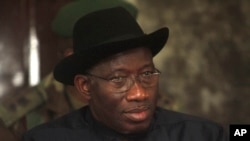ABUJA —
On Monday, Nigerian President Goodluck Jonathan said his country intends to harness nuclear energy for development purposes - which to most Nigerians means one thing: providing electricity. But some analysts say that Nigeria should figure out how to keep the lights on with the huge natural resources it already has.
Nigeria’s nuclear aspirations began in 2007, when then-President Umaru Yar'Adua said the country planned to add nuclear power to the national grid by 2017.
The original deadline seems to be off the table, but officials say the plan is still on track.
“Nigeria is on course in its plan to have nuclear power that is used for nuclear energy for peaceful use. And one of the things we’ve done is to have the institutional framework in place,” said Eli Jidere Bala, the director general of the Energy Commission of Nigeria.
Bala said Nigeria has established a regulator, research facilities and is working with the International Atomic Energy Association.
“We are planning between 1,000 megawatts and 2,000 megawatts for the first instance before, very shortly. I know it takes time to plan nuclear. You must plan. It takes about eight years for planning etc., etc. So we are targeting at 1,000 to 2,000 megawatts,” explained Bala.
Nigeria currently has a capacity of just 4,000 megawatts, which means roughly half the country's 160 million people have no electricity at all, and most others only have it for a few hours a day.
Nigerian journalist and commentator Wole Olaoye has been covering the power sector here for nearly four decades. He said that since Nigeria became a democracy in 1999, every president has promised to provide electricity for the entire country.
“President Jonathan promised us, ‘Oh, in 18 months’ he would do it. Then it became 24 months. Then it became 36 months. Then it became 2014. Now they are saying 2015,” said Olayoe.
Even if the government’s plan to add nuclear power to the national grid comes to fruition, he added, he doesn’t think it’s a good one.
Oil-rich Nigeria already has more than enough national resources to provide enough power for everyone, he said, but the power sector is wracked with corruption and mismanagement. While the country may have the expertise to develop nuclear power, it doesn’t have the capacity to maintain power plants safely, he added.
“We have security problems in Nigeria right now. And I don’t want to think of a situation where we will manage the fallout of a nuclear leakage. With the level of incompetence with which have treated our hydro-power stations, I don’t see us managing nuclear power competently and efficiently,” said Olayoe.
Olaoye said introducing anything that could be turned into a weapon of mass destruction into Nigeria, where Boko Haram militants have been fighting the government since 2009, could be extraordinarily dangerous.
Other analysts support the president’s plan, saying nuclear energy can also be used for medical reasons, to make drinkable water from seawater, or for space programs.
Given the amount of controversy that nuclear energy programs can generate, they say, the Nigerian president wouldn’t bring it up if he was not serious.
Nigeria’s nuclear aspirations began in 2007, when then-President Umaru Yar'Adua said the country planned to add nuclear power to the national grid by 2017.
The original deadline seems to be off the table, but officials say the plan is still on track.
“Nigeria is on course in its plan to have nuclear power that is used for nuclear energy for peaceful use. And one of the things we’ve done is to have the institutional framework in place,” said Eli Jidere Bala, the director general of the Energy Commission of Nigeria.
Bala said Nigeria has established a regulator, research facilities and is working with the International Atomic Energy Association.
“We are planning between 1,000 megawatts and 2,000 megawatts for the first instance before, very shortly. I know it takes time to plan nuclear. You must plan. It takes about eight years for planning etc., etc. So we are targeting at 1,000 to 2,000 megawatts,” explained Bala.
Nigeria currently has a capacity of just 4,000 megawatts, which means roughly half the country's 160 million people have no electricity at all, and most others only have it for a few hours a day.
Nigerian journalist and commentator Wole Olaoye has been covering the power sector here for nearly four decades. He said that since Nigeria became a democracy in 1999, every president has promised to provide electricity for the entire country.
“President Jonathan promised us, ‘Oh, in 18 months’ he would do it. Then it became 24 months. Then it became 36 months. Then it became 2014. Now they are saying 2015,” said Olayoe.
Even if the government’s plan to add nuclear power to the national grid comes to fruition, he added, he doesn’t think it’s a good one.
Oil-rich Nigeria already has more than enough national resources to provide enough power for everyone, he said, but the power sector is wracked with corruption and mismanagement. While the country may have the expertise to develop nuclear power, it doesn’t have the capacity to maintain power plants safely, he added.
“We have security problems in Nigeria right now. And I don’t want to think of a situation where we will manage the fallout of a nuclear leakage. With the level of incompetence with which have treated our hydro-power stations, I don’t see us managing nuclear power competently and efficiently,” said Olayoe.
Olaoye said introducing anything that could be turned into a weapon of mass destruction into Nigeria, where Boko Haram militants have been fighting the government since 2009, could be extraordinarily dangerous.
Other analysts support the president’s plan, saying nuclear energy can also be used for medical reasons, to make drinkable water from seawater, or for space programs.
Given the amount of controversy that nuclear energy programs can generate, they say, the Nigerian president wouldn’t bring it up if he was not serious.





